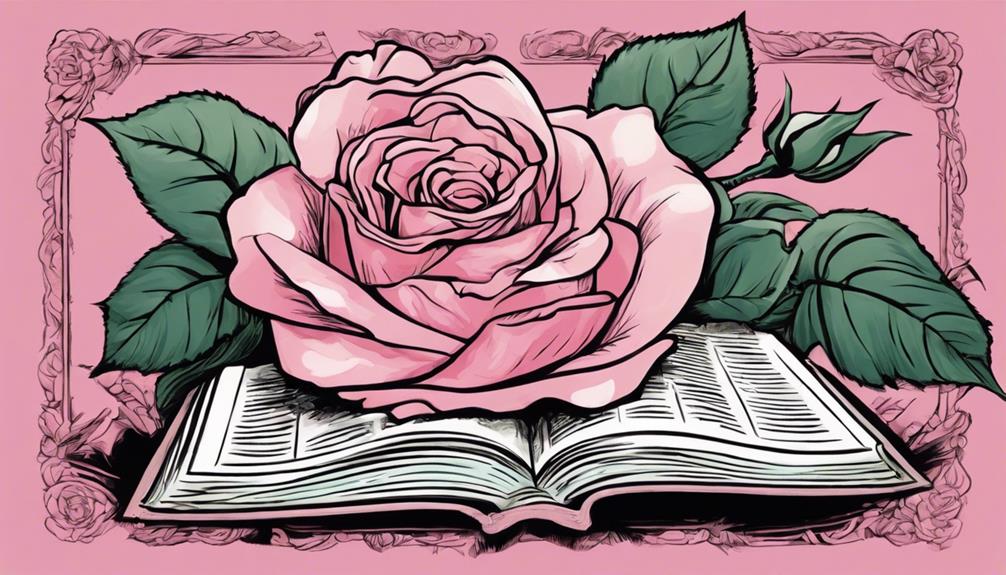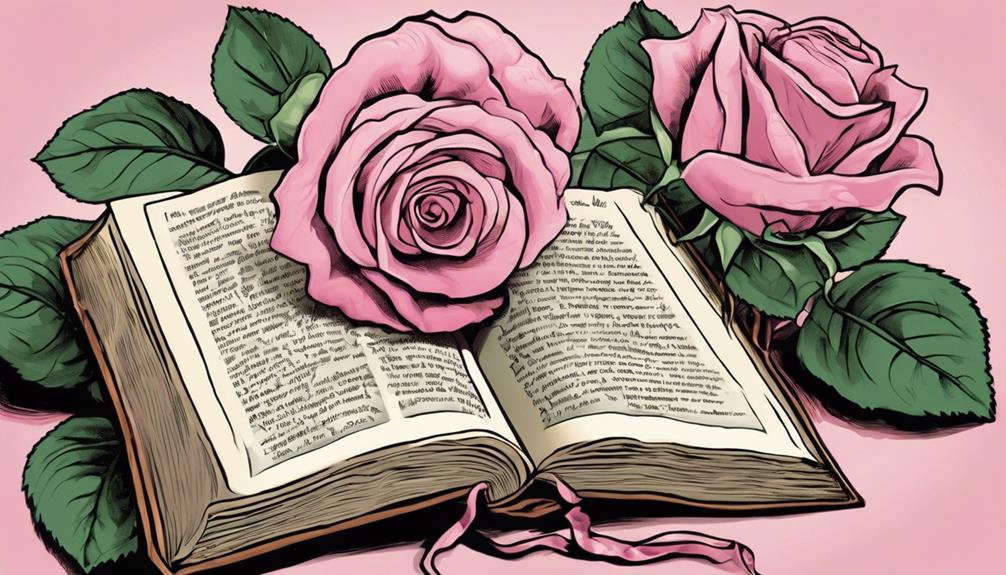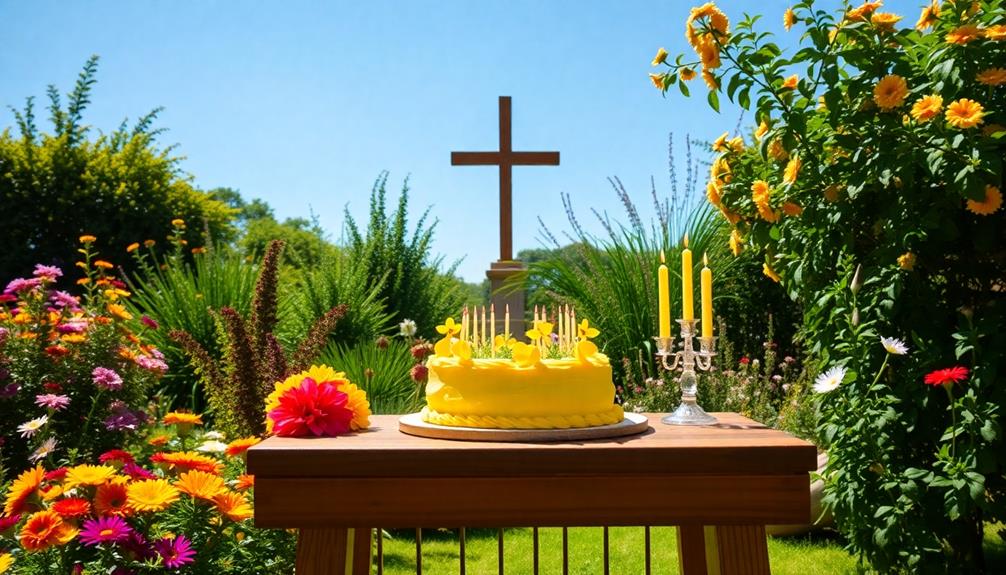Reveal the divine beauty and explore the deep spiritual meanings of flowers in the Bible. Explore enchanting verses that intertwine faith with the delicate petals of nature's most stunning creations. Uncover the intricate tapestry of faith reflected in the beauty of flowers, offering lessons of renewal, trust, and divine provision. Dive deeper into the Biblical floral symbolism that embodies transience, beauty, and God's abundant care. The collection of verses awaits, ready to immerse you in the profound messages of joy, purity, and spiritual truths conveyed through the floral treasures of the scriptures.
Key Takeaways
- Bible verses mention roses, lilies, and other flowers.
- Flowers symbolize faith, beauty, and spiritual lessons.
- Biblical flowers convey messages of trust and renewal.
- Verses reflect on God's provision through floral imagery.
- Scriptures teach about God's care and life's fleeting nature.
Rose of Sharon Origins
The origins of the term 'Rose of Sharon' can be traced back to its first mention in the Hebrew Bible in the Tanakh. In the Bible, the 'Rose of Sharon' is believed to refer to a flowering plant mentioned in the Song of Solomon. The exact identity of this flower is debated among scholars, with suggestions ranging from the crocus, tulip, to the lily.
Remarkably, the Hebrew word 'ḥăḇaṣṣeleṯ' translated as 'rose' in the King James Version is etymologically linked to words meaning bulb and pungent/splendid, adding depth to the symbolism.
King Solomon, known for his wisdom and poetic prowess, incorporated the 'Rose of Sharon' into his writings, elevating its significance as a symbol of beauty and grace. This ancient flower continues to captivate minds and hearts, with modern horticultural plants like Hypericum calycinum and various species of Hibiscus also being referred to as the 'Rose of Sharon.'
The enduring allure of the 'Rose of Sharon' persists through time, connecting us to the poetic and symbolic language of the Bible.
Rose of Sharon Today
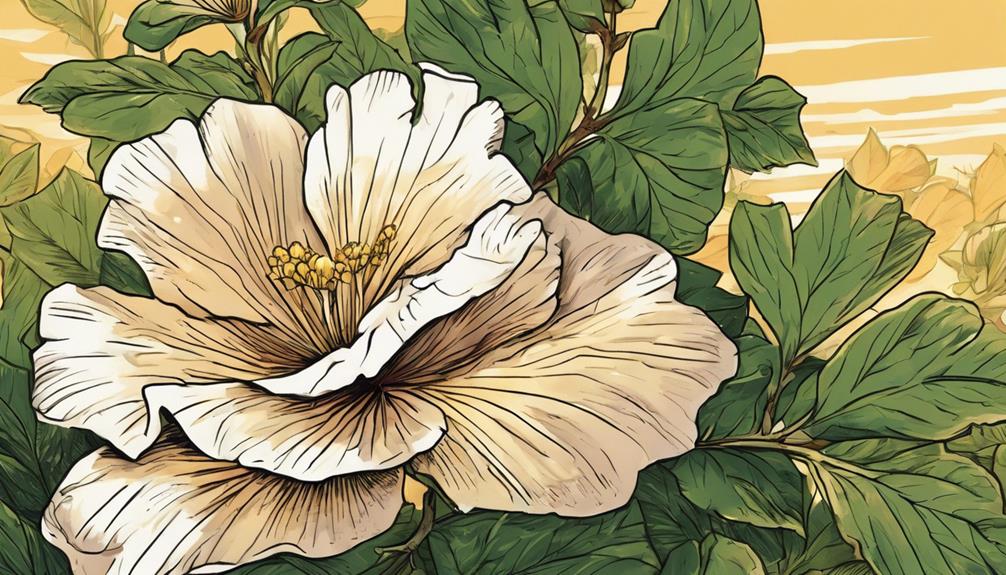
Today, horticultural enthusiasts commonly refer to various plants like Hypericum calycinum and Hibiscus syriacus as the 'Rose of Sharon.' These plants exhibit a diverse range of characteristics and are beloved for their beauty and symbolism in gardens worldwide.
- Hypericum calycinum: This evergreen shrub, originating from southeast Europe, is a popular choice for ground cover due to its vibrant yellow flowers.
- Hibiscus syriacus: Known for its stunning blooms, this deciduous shrub hails from east Asia and adds a touch of elegance to any garden.
- Hibiscus rosa-sinensis: As the national flower of Malaysia, this Hibiscus variety stands out with its large, colorful flowers that symbolize beauty and grace.
- Rose of Sharon Varieties: The term encompasses not just one plant but a group, each with its unique features and allure.
- Floral Faith Connection: The modern interpretation of the Rose of Sharon continues to evoke a sense of reverence and tranquility, intertwining nature's beauty with spiritual reflection.
Biblical Rose of Sharon References
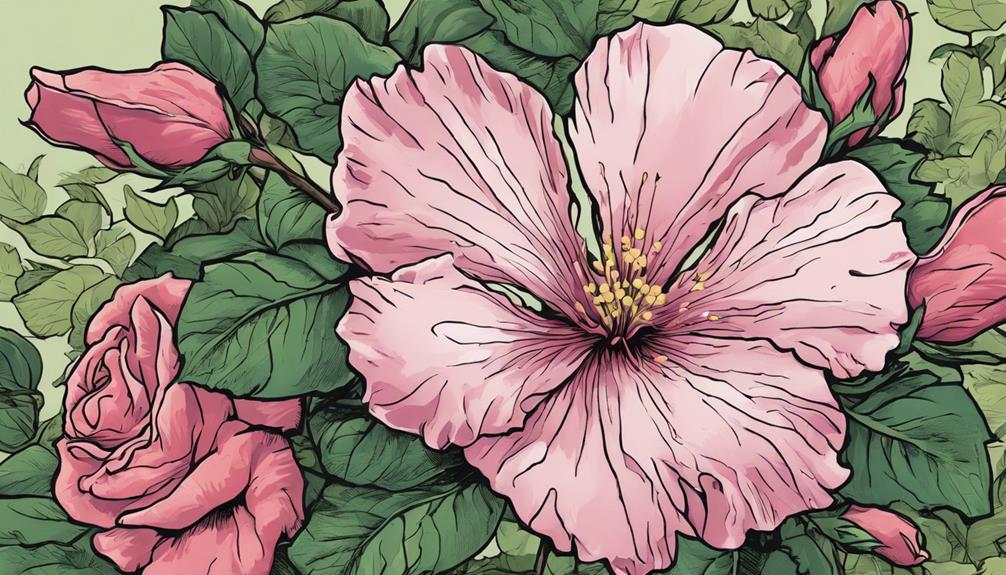
Let's first dive into the symbolic interpretations of Sharon.
Next, we'll examine the various botanical varieties suggested by scholars.
And finally, we'll uncover the cultural and historical significance surrounding the biblical Rose of Sharon.
Symbolic Interpretations of Sharon
Consider the symbolic interpretations of Sharon in the biblical references to the Rose of Sharon. The Rose of Sharon mentioned in the Song of Solomon symbolizes beauty and splendor, carrying profound meanings that captivate both scholars and enthusiasts.
Here are some intriguing points to investigate:
- The term 'Rose of Sharon' evokes imagery of elegance and magnificence in biblical contexts.
- Scholars propose that the Rose of Sharon could represent a variety of flowers like the crocus, tulip, or lily.
- The Hebrew translation of Rose of Sharon in the KJV conveys the essence of a fragrant, bulbous flower.
- Modern interpretations extend the symbolism to plants like Hypericum calycinum and select Hibiscus species.
- Etymological studies link the Hebrew term for Rose of Sharon to notions of bulbs and pungent splendor, enriching its symbolic significance.
Exploring the symbolic interpretations of Sharon opens a doorway to uncovering the layers of meaning behind the biblical Rose of Sharon references.
Botanical Varieties Explored
Exploring the various botanical varieties associated with the biblical Rose of Sharon reveals a rich tapestry of floral diversity and symbolism. The term 'Rose of Sharon' isn't limited to a single type of flower but rather encompasses a range of beautiful blooms mentioned in Scripture.
Scholars suggest that the Rose of Sharon could be symbolic of flowers like the crocus, tulip, or lily, each carrying its own significance and beauty.
In modern horticulture, plants such as Hypericum calycinum and specific species of Hibiscus are commonly referred to as the Rose of Sharon. Hypericum calycinum, an evergreen shrub originating from southeast Europe, presents delicate yellow flowers, while Hibiscus syriacus and Hibiscus rosa-sinensis offer a diverse array of colors and shapes in their blossoms.
These botanical varieties not only connect to the biblical origins of the Rose of Sharon but also showcase the enduring appeal and adaptability of these flowers in the contemporary floral world.
Cultural and Historical Significance
The historical and cultural significance of the biblical Rose of Sharon extends beyond its botanical associations to encompass a symbol of beauty and spiritual meaning in ancient texts. The mention of the 'Rose of Sharon' in the Song of Solomon evokes powerful imagery that has resonated through the ages.
The flowers of the field symbolize God's provision and care in biblical references.
The 'lily among thorns' metaphor highlights the purity and rarity of the Rose of Sharon.
The concept of springing up like flowers signifies growth, renewal, and beauty in the context of the Rose of Sharon.
The Rose of Sharon is a symbol of love and beauty in the poetic language of the Song of Solomon.
The biblical references to the Rose of Sharon emphasize its significance beyond just a botanical specimen, portraying it as a representation of divine beauty and grace.
Scholarly Sources on Rose of Sharon

Scholars have examined various botanical and historical references to uncover the true identity of the Rose of Sharon mentioned in biblical texts. The term 'Rose of Sharon' appears in the Hebrew text of the Tanakh and is translated in the King James Version of the Bible. While the exact flower referred to remains debated, scholars suggest possibilities such as crocus, tulip, or lily based on floral symbolism and linguistic analysis of the Hebrew word ḥăḇaṣṣeleṯ.
Additionally, modern horticultural plants like Hypericum calycinum, Hibiscus syriacus, and Hibiscus rosa-sinensis are also commonly known as Rose of Sharon. These plants vary from evergreen shrubs like Hypericum calycinum originating from southeast Europe to deciduous shrubs like Hibiscus syriacus native to east Asia.
Through scholarly sources and botanical exploration, the mystery behind the biblical Rose of Sharon continues to captivate researchers and enthusiasts alike.
Types of Flowers in the Bible
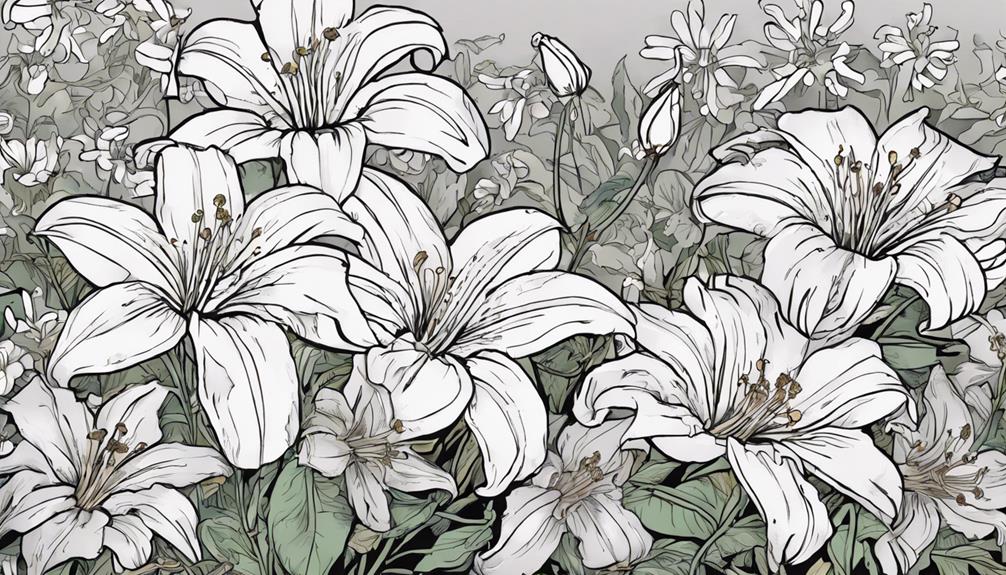
In the Bible, various types of flowers, such as roses, lilies, almond blossoms, and pomegranates, hold symbolic significance and convey spiritual messages. When exploring the types of flowers mentioned in the Bible, you'll find a rich tapestry of symbolism and meaning:
- The flower of the field represents the transient nature of life and the importance of trusting in God's provision.
- The lily of the valleys symbolizes humility and the beauty of God's creation in the midst of adversity.
- Thorns is my darling reminds us of the paradoxical nature of suffering and beauty intertwined in God's plan.
- Wild flowers grow serve as a reminder of God's care for even the smallest details in his creation.
- Fields grow showcase the abundance and fertility that God provides to sustain his people.
These various types of flowers in the Bible not only add beauty to the scripture but also serve as powerful metaphors for spiritual truths and God's loving care.
Bible Verses on Flowers
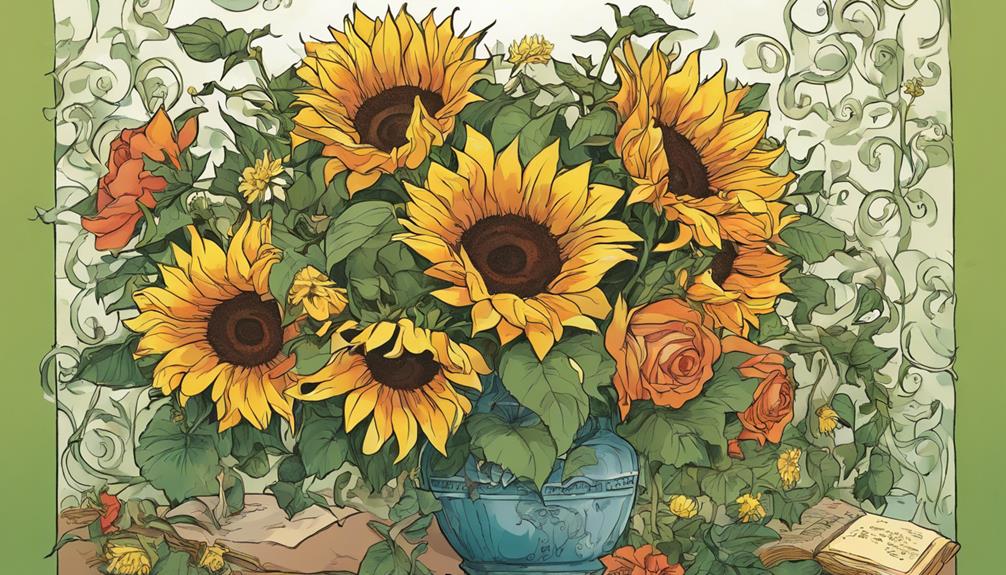
Discover within the pages of the Bible an array of verses that beautifully intertwine the essence of flowers with spiritual truths and divine teachings.
Flowers in the Bible aren't merely decorative elements; they carry deep symbolic meanings that impart valuable lessons about faith, trust, renewal, and the fleeting nature of life.
Specific blooms like lilies and roses are recurrent in biblical passages, symbolizing beauty, growth, and God's provision for His creation.
Different types of flowers mentioned in the Bible, such as roses, lilies, and pomegranates, hold significant symbolic meanings that enrich the spiritual messages conveyed in the verses.
Flowers play an essential role in Jewish and Christian traditions, adorning churches and symbolizing virtues in religious practices.
Biblical Nature References

How do biblical nature references in the Bible illuminate the beauty and significance of God's creation?
The Bible is rich with vivid descriptions of nature that convey profound spiritual truths. Consider these intriguing aspects:
- Flowers appearing on the earth: The Bible often uses flowers as symbols of God's provision and beauty, showcasing His creativity and attention to detail.
- People are like grass: Comparing humans to withering flowers or grass highlights the transient nature of life and emphasizes the eternal power of God.
- Well-watered garden: Imagery of a well-watered garden in the Bible represents abundance, growth, and flourishing under God's care and protection.
- Flowers fading and withering away: This imagery serves as a reminder of the temporary nature of earthly life and the importance of focusing on eternal values.
- Biblical depictions of nature: Through descriptions of flowers blooming in the wilderness, the Bible emphasizes themes of renewal, hope, and God's unfailing provision.
Flowers as Biblical Symbols

Explore the rich symbolism of flowers in the Bible, from conveying spiritual truths to teaching lessons on faith and purity.
Biblical passages beautifully use flowers to represent God's provision, care, and the transient nature of life, offering messages of hope and joy.
Reflect on the profound meanings behind floral references in Scriptures, finding inspiration in the beauty and symbolism of God's creation.
Biblical Flower Symbolism
In the Bible, flowers serve as powerful symbols representing beauty, transience, growth, and renewal. When exploring biblical flower symbolism, you'll find that these delicate blooms hold deep spiritual significance.
- The Lord will guide: Just as flowers lean towards the sun for nourishment, we're encouraged to seek God's guidance for our sustenance.
- Withers and the flowers: The imagery of withering flowers reminds us of life's fleeting nature and the importance of cherishing each moment.
- Flowers appear: Like flowers blooming after a harsh winter, biblical stories show how beauty can emerge from challenging circumstances.
- Wind blows: Just as the wind can scatter petals, biblical flowers teach us about the unpredictable nature of life and the need for resilience.
- Fading flower: The concept of a fading flower highlights the temporary nature of worldly things, emphasizing the eternal value of spiritual growth and renewal.
Spiritual Lessons Through Flowers
As you explore the symbolism of flowers in the Bible, you'll uncover profound spiritual lessons woven into these delicate blooms. Flowers symbolize beauty, reminding us of the intricate and awe-inspiring creations of God. They also represent transience, teaching us about the fleeting nature of life and the importance of seizing the present moment.
Just as flowers undergo growth and renewal, believers are encouraged to embrace personal growth and spiritual renewal in their faith journey.
Specific flowers like lilies and roses convey essential lessons about faith, trust, purity, and spiritual truths found in biblical teachings. Through the mentions of flowers in various passages, the Bible emphasizes God's care, joy, celebration, and the richness of His creation.
Reflecting on these lessons from flowers prompts believers to contemplate the significance of faith, trust in God's provision, and the beauty that can be found in the ephemeral nature of life.
Floral Messages in Scriptures
Delving into the Bible, you'll discover an array of floral messages symbolizing profound spiritual truths and divine care. When exploring the flowers in the Bible, you'll find that they serve as powerful symbols conveying essential messages about faith, provision, and the transient nature of life. Here are five intriguing aspects of floral messages in Scriptures:
- Flowers in the Bible symbolize beauty, growth, renewal, and God's provision for His creation.
- Specific flowers like lilies and roses convey lessons about faith, purity, and trust in God.
- Biblical passages use flowers to teach spiritual truths and convey messages of joy and celebration.
- The symbolism of flowers in the Bible reflects themes of transience, beauty, and the richness of God's creation.
- Flowers in the Bible prompt believers to reflect on spiritual truths, divine care, and the fleeting nature of life.
Are There Specific Bible Verses with Flowers That Can Be Found in Both Sets of Quotes?
Yes, there are specific psalm bible quotes with flowers that can be found in both sets of quotes. Some of these verses include “The grass withers, the flower fades, but the word of our God will stand forever” (Isaiah 40:8) and “Consider the lilies of the field, how they grow: they neither toil nor spin” (Matthew 6:28).
Conclusion
So next time you see a beautiful flower, remember the words of the Bible that connect them to faith and beauty.
Just like the Rose of Sharon symbolizes the love of God, let these blossoms remind you of the eternal beauty and grace in the world around you.
Embrace the floral faith and let it inspire you to see the divine in every petal and bloom.
